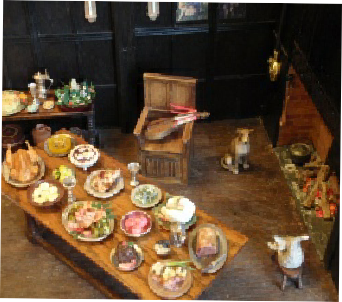Merry Gourmet Miniatures © 1988 - 2025 Designed By Bluechip Computer Support




|
All through the last 3 months of the year the Tudor housewife and her household were preparing for the Christmas Festivities. After the Harvest, any comestible that could be made and kept ahead of time, would have been stored in cool dry cupboards in the pantry or still room. The Tudors and Elizabethans had a sweet tooth so the still rooms and kitchens would have been very busy producing candied and crystallized fruits, sugar coated seeds and nuts, fruit marmalades, gilded and boxed; macaroons, meringues and striped sugar paste, sweet wafer biscuits, marchpane (marzipan) to make into cakes and dainties, cordials and flower wines distilled and bottled. Some of these would be given to friends and neighbours as Christmas or New Year gifts.
But the majority would be stored for the extended feasting as the celebrations lasted
12 days from Christmas Eve till January 6th. During this time, on the many manors
and estates, open house was held. For not only were servants and villages entertained, but family were welcomed with the best that could be offered. Even the mummers who came to perform their annual play on Twelfth Night were give pies and ale. So although Christmas was celebrated as a religious occasion and a welcome mid winter holiday, the most lavish feasting and entertainment was reserved for 12th Night (January 6th). Amongst all the plentiful fare assembled for the feast two dishes took pride of place - the boars head, decorated with bay and rosemary was the star of the show, being a status symbol and the centre-piece of the meal. While the other dish was the Twelfth Night Cake, one made for the ladies and one for the men. This was a large fruitloaf decorated with gilded marchpane into which had been baked a dried bean for the men and a dried pea for the women. The man who found the bean became King of the Festivities for the night and the Lady who found the pea in her slice became his Queen. They had the places of honour for the ensuing revels which included gambling, dancing, games and contests, magic, entertainment and most important of all the activities in homes high and low, the "wassailing". Wassail is an old English word for a toast, similar to "Good Health" drunk in special spiced cider or mulled ale. The traditional Wassail dates back to the 12th Century and the song that accompanies it is one of the few carols that does not celebrate the Nativity but the New Year. Sung by the mummers, the host and all his guests joined them in the orchard to toast the oldest apple tree to ensure a good crop and good fortune for the house and all who were there for the coming year. " Here we come a-wassailing, Among the leaves so green, Here we come So to all our customers, friends and visitors may we say "Wassail" and good fortune to you and yours for the New Year. |
As Thomas Tusser in the 16th Century wrote …
"Good husband and housewife, now chiefly be glad, Things handsome to have, as they ought to be had. They both do provide, against Christmas do come, To welcome their neighbours, good cheer to have some.
Good bread and good drink, a good fire in the hall, Brawn, pudding and souse, and good mustard withal. Beef, Mutton and pork, and good pies of the best, Pig, veal, goose and capon, and turkey well drest, Cheese apples and nuts, and good carols to hear, As then in the country is counted good cheer” "
